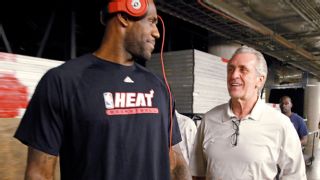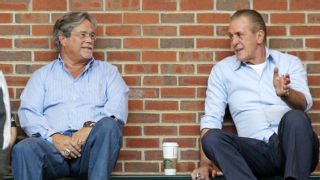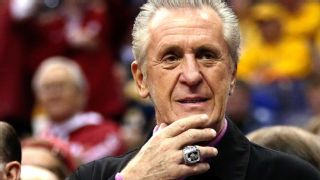|
MIAMI -- Pat Riley had already executed the greatest coup in the history of NBA free agency, but his maneuvering was far from finished. The Miami Heat president had locked up LeBron James, the league's premier player, as the centerpiece of a star-studded haul that included the addition of Chris Bosh and the re-signing of Dwyane Wade. But on one of James' first nights in South Florida in the summer of 2010, the superstar was struggling with the emotional departure from his home state of Ohio while his now-wife, Savannah, was anxious about their family's transition. On top of everything else, the couple was starving. Savannah craved Italian. LeBron settled into his normal role as facilitator. And with one phone call, Riley switched from franchise cornerstone to James family concierge. "It was a place out in Coral Gables," James said this week. "I made one call to him. He made one call, and everything was set up before we got in there. Everything was taken care of. They gave us the back room of the restaurant and everything. It was spectacular. And Savannah got what she wanted." James then laughed and shook his head in disbelief. "Obviously, the game of basketball is what's most important," James said. "But the family side is just as important, because if the family isn't secured then it affects everything else. [Riley] wants to win more than anything. But he cares about how your family and your kids and the people around you are doing. And that's huge, especially in this business. When you're here, you feel that." That family-friendly approach and personal touch have helped Riley to execute blockbuster player acquisitions and build championship contenders for parts of three decades. But with potential luxury-tax penalties looming, and James, Wade and Bosh all able to opt out of their contracts after this season, Riley faces perhaps the biggest challenge of his front-office career to keep his surrogate Heat family intact.  According to the ESPN Forecast panel, the Heat rank second behind the San Antonio Spurs in a rating that gauges the success, stability and decision-making of a franchise's ownership, front office and coaching staff. The Heat's management (president/GMs) also ranks second, behind the Spurs. Riley's résumé, as a Hall of Fame coach and executive, along with his reputation one of the league's most respected -- and shrewd -- businessmen in the game, have made him as polarizing as he is successful. But his methods and high-risk gambles have frequently produced championship results -- seven, to be exact -- from his days coaching the Showtime Lakers and overseeing major overhauls of the Heat's roster. But even Riley, who once compared himself during trade talks to a riverboat gambler, has concerns about the uncertainty that looms after this season. "You always fear," Riley told ESPN.com. "It's not a real fear. I always have concern when players are in the situation they're in. But we feel we have the best organization in the league for those players to stay, and to also attract others to want to come here. With our three guys, we hope that this turns into a generational team. And that it's not just we're at the end of this four-year run right now because players have some options this summer." The Heat have endured a wild ride with their current roster. James has fallen slightly off his MVP pace from previous seasons and Wade has missed 23 games this season, primarily as a cautionary measure to protect his balky knees. There have been 19 different starting lineups and the team still doesn't have a strong feel for what offseason acquisitions Michael Beasley or Greg Oden might provide in the playoffs. And Miami is relying heavily on veterans in their mid-to-late 30s -- Ray Allen, Shane Battier and Chris Andersen -- to bolster the bench. Yet the Heat have pushed through it all, moving into first place in the East with nine games left in the regular season. Riley's confidence in his roster has withstood some frustrating and inconsistent stretches this season. The Heat president started his career coaching Magic Johnson, Kareem Abdul-Jabbar and James Worthy to four titles over the span of nearly a decade in the 1980s. Now Riley, who turned 69 last month, has visions of a perfect bookend to his decorated career. The goal is to retool the Heat's roster around James, Wade and Bosh to keep them together and in title contention for another handful of years and produce another dynastic decade. Despite difficult financial decisions looming amid a more punitive luxury tax set to kick in this offseason, Riley hopes to rely on three franchise pillars that have kept the Heat proactive and productive all these years. It starts with stability. Riley believes he still works for a team owner in Micky Arison who remains as committed to winning and producing an elite product now as he was when they first met 19 years ago. Securing James in 2010 was the most recent splash, but Riley points out that Arison has been willing to create waves for decades. The process began in 1995 when, just two months after Riley was hired, Arison signed off on a trade that brought in Alonzo Mourning and later led to deals for P.J. Brown, Juwan Howard, Tim Hardaway and Dan Majerle. Riley said what the Heat pulled off in the summer of 2010 was similar to what they initially had visions of doing over a nine-month span in the mid-1990s before the NBA voided Howard's contract. "Ever since I came here, and Micky and I hooked up, the whole concept was you wanted to win," Riley said. "He really wanted to win and wanted to put on a great show and have a great product. Right off the bat, right out of the blocks, we were able to trade for Alonzo. Then the league took Juwan away. But Micky has always been one that tactically and with great thought, weighing all the pros and cons, has swung for the fences. And I have too." Ten years later, Arison and Riley saw their next major makeover blossom into the franchise's first championship team when Wade, then in his third year, and Shaquille O'Neal led the Heat past Dallas in six games to win the 2006 NBA Finals. It was immediately after that title when Riley began planning for their current championship reality. While many believe James, Wade and Bosh -- three of the top five picks in the 2003 draft -- began plotting their course to eventually becoming teammates during their time together in the 2008 Olympics, Riley already had planted his own seed the day Wade signed his first major extension in 2006. "This is how I think you plan and have a vision and look forward, hoping you can do something that's special," Riley said. "Coaching Kareem and Magic and James Worthy, and playing against [Larry] Bird, [Kevin] McHale and [Robert] Parrish, and [Joe] Dumars, Isiah Thomas and [Bill] Laimbeer, you need to have three really, really great players. There's two superstars and another truly great player. You've seen that on pretty much all championship teams have had that kind of element." Riley remembers getting a call from Heat general manager Andy Elisburg on July 11, 2006. "Andy was at a gas station," Riley said. "And he said Dwyane had accepted his extension, and it was a three-plus-one [three years guaranteed, plus one option year]. And it was Dwyane and LeBron James and Chris Bosh and Amar'e Stoudemire and a bunch of other guys that signed their extensions and they're all three years with one option. And I said, 'Well, who are the other guys?' And he gave me the list. And I said, 'Well, we're going to be players in 2010.'" The heavy lifting -- swapping Shaq for Shawn Marion, then Marion for Jermaine O'Neal and other moves to clear the decks -- commenced. Along the way, there were some blunders, such as the Smush Parker experiment and the Ricky Davis and Mark Blount desperate attempts that resulted in a 15-67 season that produced the No. 2 lottery pick used to draft Michael Beasley in 2008. Beasley came. Beasley went. Beasley came again, eventually. But amid all of Riley's roster building and burning and rebuilding over the years, very little emphasis was ever placed on the draft or tapping into the foreign-player market. "Everything we did from 2006 to 2010 was to be able to sit down at the table with LeBron and Chris and Amar'e and [Carlos] Boozer and Mike Miller, all these guys, to try to bring them to Miami," Riley said. "We were fortunate that they came, but we also planned for it. There have been some deals that we've made that haven't worked, but they haven't really been deals that really cost us a lot or hurt us." Just as he planned in 2006 for the possibilities that came to fruition in 2010, Riley (with Arison) began exploring his options for this offseason while the ink dried on the contracts signed by James, Wade and Bosh four years ago.  Perseverance amid some doubts and uncertainty is the other bedrock that will carry Riley and the Heat's front-office staff into and through what could be pivotal summer. The Heat's Big Three could all come back and play out one or both of the final two seasons remaining on their respective contracts. James told NBA TV in February that he couldn't envision a scenario in which he would leave Miami. Wade has said he hopes to retire someday having played his entire career with the Heat. And Bosh repeatedly has said he'd prefer to remain with the team. Bosh knows firsthand just how persuasive Riley can be when he gets you in a room with a major decision to make. Like James, Bosh still hasn't forgotten the impact of Riley's personal touch. "You listen to what he says, and he knows it," Bosh said. "I remember he was talking to me as we were having a meeting and I wanted to start the season that minute. He just has that 'been there, seen it all and this is what you have to do [element]' about him. He comes around you, and you stand up straight." And it's usually then when Riley executes his go-to move. He pulls out one of the nine championship rings he has won as a player, executive, head coach and assistant coach. And he proposes. Riley dropped a bag full of title rings on LeBron's table in Cleveland during their 2010 meeting. He has flashed at least one of them to a few other free-agent targets over the years. Bosh took matters a step further. "He gave me one of his championship rings from 2006, and was like, 'You give me that back when you come here and win yours.'" Bosh said. "So I took it. I was like, 'Oh, man!' Don't tell me to take something if you don't want me to take it. I've still got it, too. But I told him I'd give it back after this year." But Riley admits he's had to adapt in some other ways to better relate to modern NBA culture. In the past few seasons, he has opened a Twitter account, relented on his stance against players wearing headbands and has allowed James' manager and the personal trainers for James and Wade greater access. But mostly, Riley steps back and allows coach Erik Spoelstra to legislate the team culture. "LeBron, being who he is in this world, in this game, has a very heavy load," Riley said. "There's a heavy load off the court and on the court. It's a lot different than what it used to be. He manages everything he has to manage that maybe Magic Johnson didn't have to manage back in the 1980s. I've adapted to that." The evolution hasn't been easy but it has become necessary. "It doesn't mean that it's so rigid that it can't change somewhat," Riley continued. "And there's a plan. I think we take great pride as an organization in how we do things. Even though some things are blurted out on Twitter or Instagram that sometimes I cringe at. But hey, it's their life. As long as it's not detrimental to us and what we're trying to do, then that's the nature of the life we're living today." In the past four years, James has grown into a two-time champion who also added a total of four regular-season and Finals MVP trophies to his collection in Miami. Arison, Riley and Spoelstra will certainly have to retool the roster again this offseason -- one way or another -- to convince James, 29, he can compete for championships long term with the Heat. But James remains confident in Riley's track record. James also acknowledged the challenges a harsher luxury tax in the CBA represents, "the business side that hurts relationships," but that his "connection with Riles" is always something he can fall back on regardless of looming decisions. "He doesn't have to prove anything to anyone. Not me, not Dwyane, not Chris. No one," James said. "His résumé speaks for itself. His stature speaks for itself. So we'll see what happens." Riley didn't build his reputation as one of the NBA's must successful team architects on losses. Not in games, nor in personnel matters. There's plenty at stake as Riley and the Heat's front office pad their legacies. But don't expect Riley to retain his superstars by recruiting this time around as much as reminding them of what already has been accomplished and established. He'd rather have LeBron, Bosh and Wade reflect on their own résumés as they contemplate their upcoming options. "You have to have a big-picture approach. That's what I do best; I try to see the big picture," Riley said. "Look at the reward they have. They got exactly what they wanted. Look at where they were before and look at what's happened to them. They joined forces, they all sacrificed money, sacrificed roles. What they got out of it was back-to-back championships, and the opportunity this year to win another one." Considering those results, Riley can't imagine why anyone would want to stop now. "It would be very hard for me to think anybody would walk away from the possibility of making this a long-term happening that can go for 10 or 12 years," he said. "But you never know. You just don't know."
|


